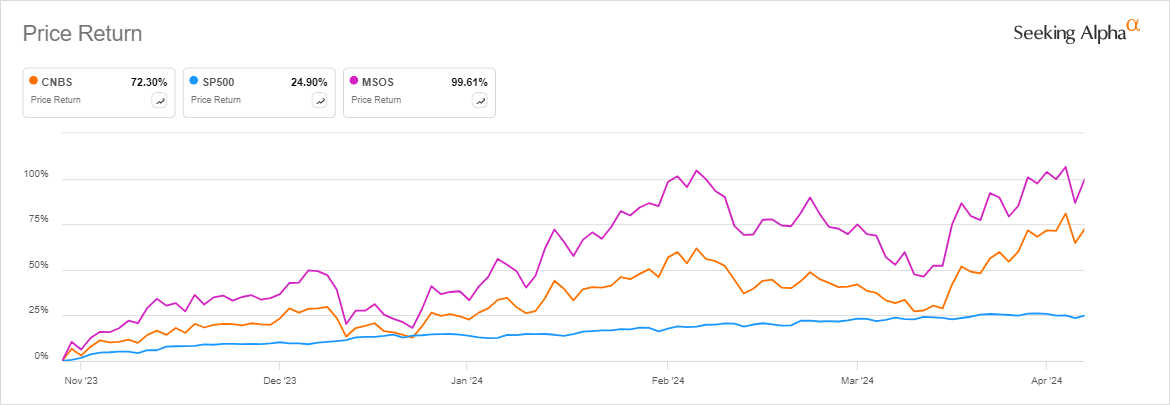Bet_Noire
Pot stocks have bounced back from recent lows as investors await favorable regulatory changes in the U.S., while others have raised concerns of a sharp reversal if upcoming catalysts fail to materialize.
Amplify Seymour Cannabis ETF (NYSEARCA:CNBS), representing the global cannabis industry, including Canadian licensed producers, has returned more than 72% since its October low, eclipsing a ~25% rise in the S&P 500 (SP500).
Cannabis ETF AdvisorShares Pure U.S. Cannabis (NYSEARCA:MSOS), a benchmark for U.S. multi-state operators, has outperformed even further, nearly doubling from a multi-year low in August, just before the sector witnessed the first major stock-moving event.

In late August, a letter from the U.S. Department of Health and Human Services (HHS) recommending cannabis be classified as a low-risk substance sparked hopes of a fast-changing regulatory landscape ahead of the upcoming presidential election.
A potential rescheduling decision from the Drug Enforcement Administration (DEA) could be “imminent,” Seeking Alpha analyst Julian Lin wrote, highlighting the tax benefits cannabis operators stand to gain if marijuana is moved to Schedule III from Schedule I.
“Rescheduling cannabis to Schedule III, while falling short of decriminalization, may lead to a sudden surge in cash flows as well as declining costs of capital for these operators,” Lin wrote, reaffirming his bullish view on MSOS.
However, according to SA analyst Alan Brochstein, the “biggest risk” is that a potential rescheduling event reclassifying cannabis alongside medicines such as Tylenol will never materialize, and taxation issues will persist.
“While I believe that they can rally further if 280E gets wiped out, they have a lot of downside if not,” the analyst warned, referring to a tax code related to high-risk substances under the Controlled Substances Act (CSA).
Noting that there is no timeline for the DEA’s decision, Brochstein argued that the pot sector is troubled by financial issues. “The industry is in bad financial shape now, with the balance sheets under pressure at some companies,” Brochstein wrote with a Sell rating on MSOS.
However, former Cantor Fitzgerald analyst Pablo Zuanic disagrees. “If you take a longer-term view and own quality names, you can be comfortable that there’s a lot more upside,” said Zuanic, a managing partner of cannabis consulting firm Zuanic & Associates.
“This is a sector that’s very difficult to trade on a short-term basis,” he noted in comments to Barron’s.
This week, the cannabis sector witnessed another major catalyst when the Florida Supreme Court ruled in favor of a campaign to legalize recreational marijuana in the state, paving the way for a referendum on the November ballot.
The initiative sponsored by Smart & Safe Florida is funded by Florida-based Trulieve (OTCQX:TCNNF) along with several other MSOs, including Cresco Labs (OTCQX:CRLBF), Ayr Wellness (OTCQX:AYRWF), Curaleaf (OTCPK:CURLF), Green Thumb (OTCQX:GTBIF), and Verano (OTCQX:VRNOF).
Meanwhile, global developments have further heightened investor interest. Germany legalized cannabis this week despite several restrictions, making it the third European country—after Malta and Luxembourg—to legalize the drug for recreational use.
The event has prompted the U.S. MSO, Curaleaf (OTCPK:CURLF), which has operations in Europe, to consider a secondary listing in the region.
However, according to Brochstein, Curaleaf (OTCPK:CURLF), a favorite on Wall Street, is a Strong Sell on valuation. “The company has a lot of debt and will likely sell stock into a rally. If 280E doesn’t go away, then the stock faces substantial downside,” he concluded last month.


Be the first to comment